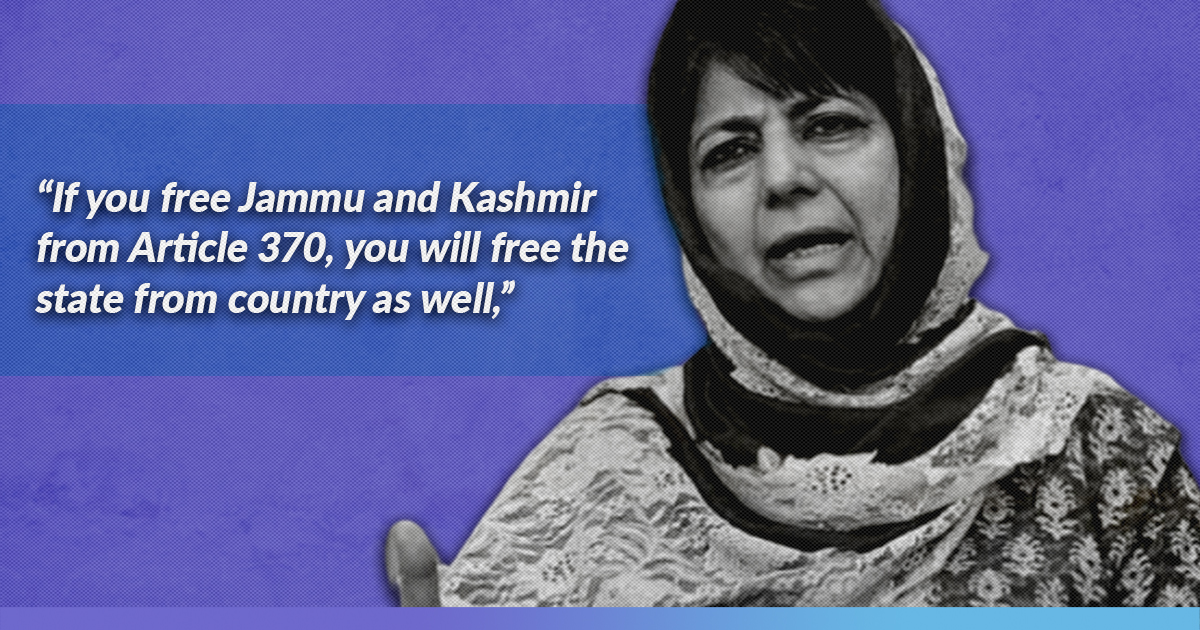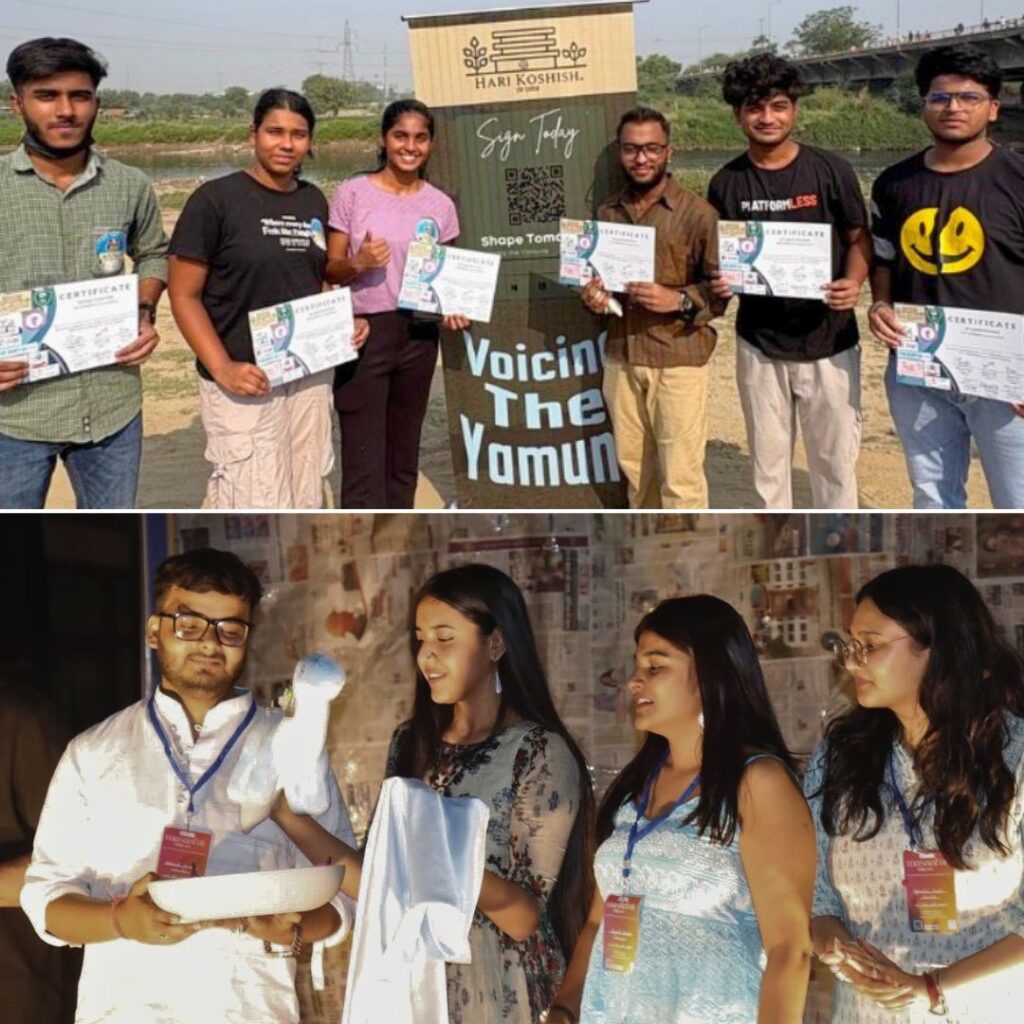Mehbooba Mufti, President of Peoples Democratic Party, said on Monday, April 8, that abrogation of Article 370 of the Constitution would result in Jammu and Kashmir’s “freedom” from India. Jammu and Kashmir is granted special status by the article.
“If you free Jammu and Kashmir from Article 370, you will free the state from country as well,” she said PTI. “I have said many times that Article 370 links Jammu and Kashmir with the country. When you break this bridge, India loses its legitimacy over the state. It becomes an occupational force.”
“There will be no Jammu and Kashmir or India left”
Mufti, the former Chief Minister of Jammu and Kashmir, was responding to a promise that was made in the Bharatiya Janata Party’s manifesto for the 2019 General Elections to abrogate Article 370 and scrap Article 35A of the Constitution. According to Mufti, the BJP-led government has not succeeded in any area, be it farmer issues, unemployment or price rise, and is therefore trying to find ways to gain votes.
Mufti said that the entire region could be threatened if there is any change in the status of Jammu and Kashmir. She said that the Pulwama terror attack gave us a glimpse of the fact that the region is a “heap of explosives”. She further said that if the BJP goes on giving such statements and having such intentions, Jammu and Kashmir will go up in flames, and no India will be left, reported Scroll.in. “If you will light a spark, everything will go up in flames… there will be no Jammu and Kashmir or India left,” she said.
Responding to reports that a case filed in the Delhi High Court seeks to debar her and National Conference chief Farooq Abdullah from the elections because of their comments, she tweeted that if the BJP scraps Article 370, they will automatically be debarred from fighting elections as Indian Constitution will no longer be applicable to Jammu and Kashmir.
Why waste time in court. Wait for BJP to scrap Article 370. It will automatically debar us from fighting elections since Indian constitution won’t be applicable to J&K anymore. Na samjho gay tou mit jaouge aye Hindustan walo. Tumhari dastaan tak bhi na hogi dastaano main. https://t.co/3mvp2lndv2
— Mehbooba Mufti (@MehboobaMufti) April 8, 2019
National Conference leader Omar Abdullah, meanwhile, slammed Jammu and Kashmir Governor Satya Pal Malik for claiming that there is no threat to Article 370 and Article 35A.
Omar Abdullah also retweeted what Congress leader Salman Anees Soz wrote, saying that since 2009, BJP has been promising to safely return Kashmiri Pandits to the Valley, and scrapping of Article 370 since 1984.
1984: Article 370
1989: Article 370
1991: Article 370
1996: Article 370
1998: Article 370
2004: Article 370
2009: Article 370
2014: Article 370
2019: Article 370#BJPJumlaManifesto— Salman Anees Soz (@SalmanSoz) April 8, 2019
2009 version: Safe return of Kashmiri Pandits
2014 version: Safe return of Kashmiri Pandits
2019 version: Safe return of Kashmiri PanditsMeanwhile, national highway closed to civilian traffic 2 days in a week. First time in 30 years of militancy. Safe?#BJPJumlaManifesto
— Salman Anees Soz (@SalmanSoz) April 8, 2019
Farooq Abdullah, three time chief minister of Jammu and Kashmir and president of National Conference (NC), also said that scrapping of Article 370 will result in paving way for “Azadi” for the state’s people.
Abdullah, while addressing an election rally in Munawarabad area of Downtown Srinagar, said, “Do they (New Delhi) think that they will abrogate Article 370 and we will be quiet? They are wrong. We will fight against it. I think it’s Allah’s will that they are trying to abrogate it. Let them do it and it will pave way for our Azadi.”
What BJP leaders said
Meanwhile, on Tuesday, April 9, BJP leaders said that Kashmir Valley leaders are playing with emotions of people over Articles 370 and 35A of the Constitution.
“The two articles have been used by politicians like Omar Abdullah, Mehbooba Mufti, Ghulam Nabi Azad and half a dozen other leaders to further their personal agenda,” State BJP President Ravinder Raina said. Business Standard reported that he further said that these leaders have basically achieved to keep ruling the state, in the name of protecting the articles.
“We have West Pakistan refugees who are denied citizenship rights because of these provisions. The state has been deeply and emotionally divided by selfish politicians… Such leaders continue to play with emotions on such issues,” former Deputy Chief Minister and Bharatiya Janata Party leader Kavinder Gupta said.
Text of Article 35A
Notwithstanding anything contained in this Constitution, no existing law in force in the State of Jammu and Kashmir, and no law hereafter enacted by the Legislature of the State:
- defining the classes of persons who are, or shall be, permanent residents of the State of Jammu and Kashmir; or
- conferring on such permanent residents any special rights and privileges or imposing upon other persons any restrictions as respects:
- employment under the State Government;
- acquisition of immovable property in the State;
- settlement in the State; or
- right to scholarships and such other forms of aid as the State Government may provide, shall be void on the ground that it is inconsistent with or takes away or abridges any rights conferred on the other citizens of India by any provision of this part.”
How did it come about?
Before 1947, J&K was a princely state under the British Paramountcy. The people of the princely states were not British colonial subjects but “state subjects”.
Article 35A was incorporated into the Constitution in 1954 by order of the then President Rajendra Prasad on the advice of the Jawaharlal Nehru Cabinet.
Following the accession of Jammu and Kashmir to the Indian Union on October 26, 1947, the Maharaja, Hari Singh, ceded control over defence, external affairs and communications to the Indian government. The Instrument of Accession and Article 370 of the Constitution of India formalised this relationship.
Discussions for furthering the relationship between the state of J&K and the Union led to the 1952 Delhi Agreement. Here, the governments agreed that Indian citizenship would be extended to all the residents of the state, but the state would be empowered to legislate over the rights and privileges of the state subjects – who would now be called permanent residents.
In his statement to the Lok Sabha on the Delhi agreement, Prime Minister Jawaharlal Nehru said:
“The question of citizenship arose obviously. Full citizenship applies there. But our friends from Kashmir were very apprehensive about one or two matters. For a long time past, in the Maharaja’s time, there had been laws there preventing any outsider, that is, any person from outside Kashmir, from acquiring or holding land in Kashmir. If I mention it, in the old days the Maharaja was very much afraid of a large number of Englishmen coming and settling down there, because the climate is delectable, and acquiring property. So although most of their rights were taken away from the Maharaja under the British rule, the Maharaja stuck to this that nobody from outside should acquire land there. And that continues. So the present Government of Kashmir is very anxious to preserve that right because they are afraid, and I think rightly afraid, that Kashmir would be overrun by people whose sole qualification might be the possession of too much money and nothing else, who might buy up, and get the delectable places. Now they want to vary the old Maharaja’s laws to liberalise it, but nevertheless to have checks on the acquisition of lands by persons from outside. However, we agree that this should be cleared up. The old state’s subjects definition gave certain privileges regarding this acquisition of land, the services, and other minor things, I think, State scholarships and the rest.
So, we agreed and noted this down: ‘The State legislature shall have the power to define and regulate the rights and privileges of the permanent residents of the State, more especially regarding the acquisition of immovable property, appointments to services and like matters. Till then the existing State law should apply.”
Also Read: SC Adjourns Hearing On Plea Against Article 35A, Unrest In Valley Over Rumour Of Scrapping It











